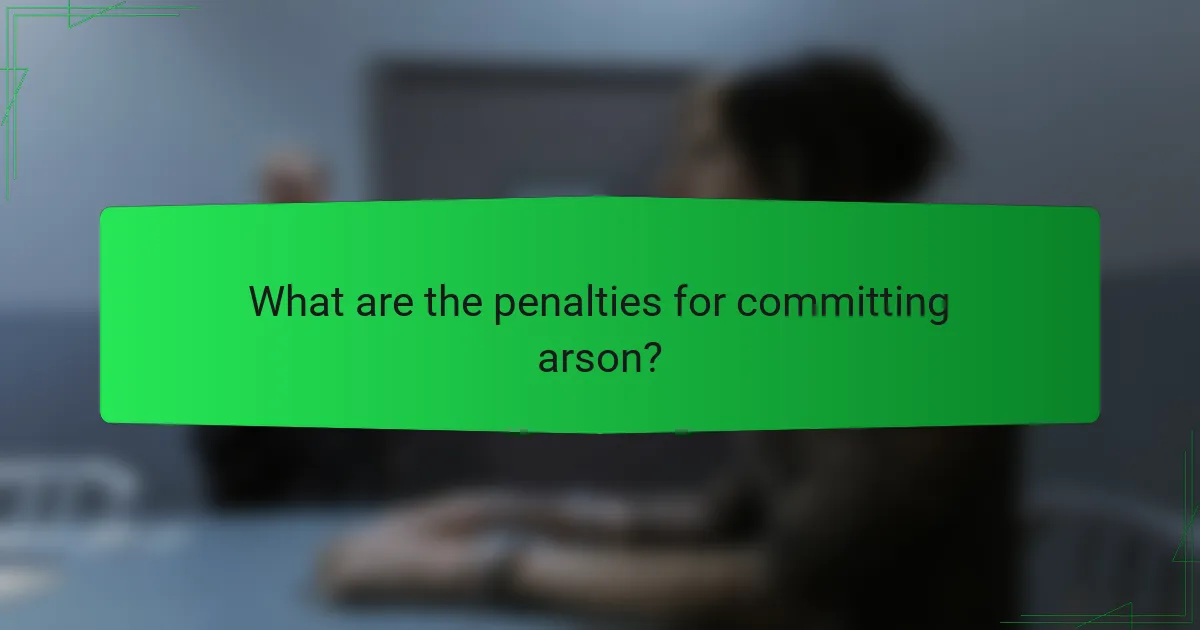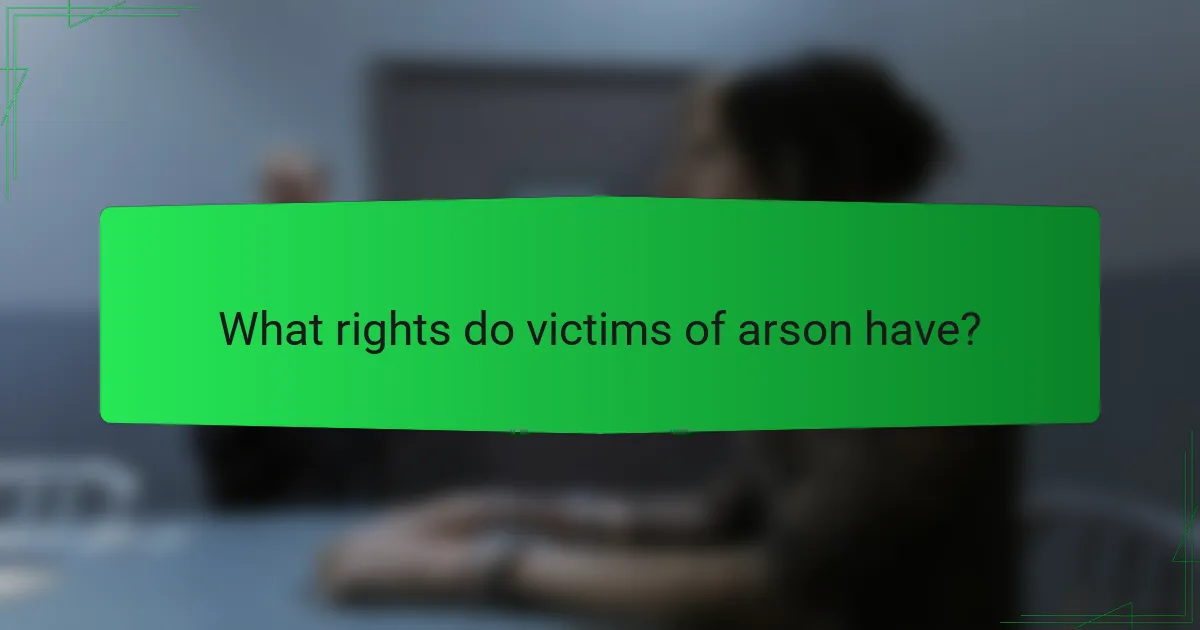Arson law pertains to the illegal act of intentionally setting fire to property, which can include buildings, vehicles, or natural areas. This crime is typically classified as a felony, with penalties that may involve imprisonment ranging from 1 to 20 years and significant fines, depending on the damage caused and the intent behind the act. Victims of arson have legal rights to seek restitution for their losses, including compensation for property damage and related expenses. They can also engage with law enforcement and victim advocacy groups for support throughout the recovery process. The evolution of arson laws reflects ongoing efforts to safeguard both property and human life from the dangers associated with this crime.

What is Arson Law?
Arson law defines the illegal act of deliberately setting fire to property. This crime can involve structures, vehicles, or wildland areas. Arson is typically categorized as a felony. Penalties for arson can include imprisonment and fines. The severity of the punishment often depends on the extent of damage caused. In many jurisdictions, arson laws are designed to protect both property and human life. Historical records show that arson laws have existed for centuries, evolving to address various risks and societal concerns.
How is arson defined in legal terms?
Arson is legally defined as the intentional act of setting fire to property. This includes buildings, vehicles, or any other structures. The intent to cause damage is a critical element in establishing arson. Many jurisdictions classify arson based on the level of damage caused or the risk to human life. For example, first-degree arson typically involves occupied structures. Legal definitions may vary by state, but the core concept remains consistent. Arson is considered a felony due to its potential to cause significant harm. Legal consequences often include severe penalties, including imprisonment.
What are the key elements that constitute arson?
The key elements that constitute arson include the intentional act of setting fire, the burning of property, and the intent to cause damage. Arson requires that the fire be willfully set, not accidental. The property can be owned by the arsonist or another party. Additionally, the fire must result in damage to the property. This damage can be to buildings, vehicles, or other structures. In many jurisdictions, the severity of the offense increases if the fire endangered lives or caused injury. The legal definition may vary, but these elements are commonly recognized in arson laws.
How does arson differ from other fire-related offenses?
Arson is the intentional setting of fire to property. This distinguishes it from other fire-related offenses, which may involve negligence or accidents. For example, accidental fires occur due to carelessness, not intent. Vandalism may involve fire but lacks the specific intent to destroy property. Additionally, fire-related offenses like reckless burning do not require the same level of intent as arson. The legal definition of arson often includes the requirement of malicious intent, which is not present in negligent actions. Statistically, arson is considered a felony, while many other fire-related offenses may be misdemeanors. This legal classification highlights the severity and intentional nature of arson compared to other fire-related actions.
What are the different classifications of arson?
Arson is classified into several categories based on intent and circumstances. The primary classifications include first-degree arson, second-degree arson, and third-degree arson. First-degree arson involves intentionally setting fire to a structure that is occupied or poses a significant risk to human life. Second-degree arson refers to the intentional burning of an unoccupied structure or property. Third-degree arson involves reckless burning that does not necessarily intend to cause harm but results in damage. Each classification carries different legal penalties and consequences, reflecting the severity of the act and its potential impact on individuals and property.
What are the degrees of arson and their implications?
Arson is typically categorized into degrees based on the severity of the act and the consequences involved. The first degree of arson involves intentionally setting fire to a structure that is occupied, which can lead to severe penalties, including long prison sentences. The second degree of arson pertains to setting fire to an unoccupied structure, with penalties that are generally less severe but still significant. Third degree arson involves the intent to burn property without regard to its occupancy status, often resulting in fines and shorter prison terms. Each degree reflects the potential risk to human life and property damage, influencing legal consequences. The implications of these degrees include varying lengths of imprisonment, restitution for damages, and a permanent criminal record.
How do different jurisdictions categorize arson?
Different jurisdictions categorize arson based on the intent and damage caused. Generally, arson is classified into degrees, such as first-degree and second-degree. First-degree arson often involves structures occupied by people and results in significant damage or risk to life. Second-degree arson typically involves unoccupied structures or property with lesser damage. Some jurisdictions also consider the type of property involved, such as residential versus commercial. Additionally, certain regions may have specific laws addressing wildfires or malicious burning. The variations in categorization reflect local legal standards and the severity of the offense.

What are the penalties for committing arson?
Penalties for committing arson can vary significantly by jurisdiction. Generally, arson is classified as a felony. Sentences may include several years in prison, often ranging from 1 to 20 years. Factors such as intent, damage caused, and whether anyone was injured can influence the severity of the sentence. Some states impose mandatory minimum sentences for aggravated cases. In addition to imprisonment, fines can also be substantial, sometimes exceeding $100,000. Repeat offenders may face harsher penalties. Overall, the legal consequences reflect the serious nature of the crime and its potential to endanger lives and property.
What factors influence the severity of arson penalties?
The severity of arson penalties is influenced by several factors. These factors include the extent of damage caused by the fire. Significant property damage can lead to harsher penalties. The presence of injuries or fatalities also affects sentencing severity. If victims are harmed, penalties are typically increased. The intent behind the act is another crucial factor. Malicious intent generally results in more severe consequences. Additionally, the location of the arson incident matters. Fires set in populated areas often incur stricter penalties. Prior criminal history of the offender can also influence sentencing. Repeat offenders may face enhanced penalties compared to first-time offenders. Lastly, state laws and regulations play a significant role in determining the severity of penalties. Each jurisdiction may have different guidelines that affect sentencing outcomes.
How does the presence of intent affect sentencing?
The presence of intent significantly influences sentencing in arson cases. Intent refers to the mental state of the defendant at the time of the offense. If a defendant acted with intent to cause damage, they may face harsher penalties. Courts often consider intent as a key factor in determining the severity of the crime. For example, premeditated arson typically results in more severe sentences compared to accidental fires. Intent can also affect whether the charge is classified as a misdemeanor or felony. In many jurisdictions, intentional acts are punishable by longer prison terms. Statistically, defendants with proven intent receive sentences that are, on average, 30% longer than those without clear intent. Thus, intent plays a crucial role in the legal outcomes of arson cases.
What role do prior offenses play in determining penalties?
Prior offenses significantly influence the determination of penalties in arson cases. Courts often consider a defendant’s criminal history when imposing sentences. A history of prior offenses can lead to harsher penalties. This is because repeat offenders are viewed as a greater risk to society. Statutes often include enhanced sentencing guidelines for individuals with previous convictions. For example, a person with a prior arson conviction may face increased prison time for a subsequent offense. This approach aims to deter further criminal behavior. Research indicates that recidivism rates are higher among individuals with prior offenses. Thus, prior offenses serve as a critical factor in the sentencing process.
What are the potential consequences beyond legal penalties?
Potential consequences beyond legal penalties for arson include financial repercussions, emotional trauma, and social stigma. Victims may face significant property loss, leading to costly repairs or rebuilding efforts. The emotional impact can include anxiety, depression, and PTSD among those affected. Perpetrators may experience social isolation and damaged relationships within their community. Additionally, arson can lead to increased insurance premiums for the victims and potentially for the perpetrator as well. The long-term effects can hinder personal and professional opportunities for the individuals involved.
How can a conviction for arson impact personal and professional life?
A conviction for arson can severely impact both personal and professional life. It often leads to a criminal record, which can hinder employment opportunities. Many employers conduct background checks and may disqualify applicants with such convictions. Additionally, social stigma may arise, affecting personal relationships and community standing.
Arson convictions can also result in significant financial penalties and restitution requirements. This financial burden can strain personal finances and lead to long-term economic consequences. Furthermore, individuals may face restrictions on certain licenses or certifications, limiting career advancement.
According to the Bureau of Justice Statistics, individuals with felony convictions are often less likely to be hired, demonstrating the lasting effects of such a conviction on employment prospects.
What are the long-term effects on one’s criminal record?
A criminal record can have significant long-term effects on an individual. It can impact employment opportunities, as many employers conduct background checks. A criminal record may also affect housing applications, as landlords often review criminal history. Additionally, it can hinder access to certain licenses or certifications required for specific professions.
Individuals with a criminal record may face challenges in obtaining loans or credit. Some states impose restrictions on voting rights for those with felony convictions. Furthermore, a criminal record can affect personal relationships due to societal stigma. Overall, the long-term effects of a criminal record can persist for years and influence various aspects of life.

What rights do victims of arson have?
Victims of arson have the right to seek restitution for damages. This includes compensation for property loss and other related expenses. They can file claims with insurance companies for recovery. Victims may also report the crime to law enforcement for investigation. They have the right to participate in legal proceedings against the perpetrator. Additionally, victims can seek support from victim advocacy groups. These groups provide resources and assistance throughout the recovery process. Legal rights vary by jurisdiction, but many states have laws protecting victims of arson.
What legal protections are available for victims of arson?
Victims of arson have several legal protections available to them. These protections include the right to seek restitution for damages incurred. Victims can file civil lawsuits against the perpetrator for compensation. Additionally, many states have victim compensation programs that provide financial assistance. Law enforcement agencies also offer support services for victims. These services may include counseling and legal assistance. Moreover, victims can report the crime to authorities for criminal prosecution of the offender. State laws often recognize the emotional and psychological impact of arson on victims. This recognition can influence the severity of penalties imposed on the perpetrator.
How can victims seek restitution for damages?
Victims can seek restitution for damages through legal processes. They may file a claim in civil court against the responsible party. This claim often seeks compensation for financial losses incurred. Victims can also request restitution during criminal proceedings. Courts may order restitution as part of the sentencing for the offender. Documenting all damages is crucial for a successful claim. Evidence like receipts and photographs can support the case. Legal assistance can enhance the likelihood of obtaining restitution.
What support services are available for arson victims?
Support services for arson victims include crisis counseling, financial assistance, and legal aid. Crisis counseling helps victims cope with trauma and emotional distress. Financial assistance may cover temporary housing and rebuilding costs. Legal aid assists victims in navigating the legal system and understanding their rights. Community organizations often provide resources and support networks. Local government agencies may also offer specific programs for disaster relief. These services aim to help victims recover and rebuild after an arson incident.
How can victims navigate the legal process after an arson incident?
Victims can navigate the legal process after an arson incident by following specific steps. First, they should report the incident to law enforcement immediately. This creates an official record of the crime. Next, victims should document all damages and losses. Photographs and written accounts are essential for insurance and legal purposes.
Victims should also contact their insurance company to file a claim. Insurance policies often have specific timelines for reporting incidents. Consulting with a lawyer experienced in arson cases is crucial. A legal expert can guide victims through the complexities of the legal system.
Victims may be entitled to compensation for damages. Understanding local laws regarding arson can help victims assert their rights. Keeping detailed records of all communications and expenses related to the incident is important. This information can support their case in court or during negotiations.
What steps should victims take immediately following an arson event?
Victims should prioritize their safety immediately following an arson event. They must evacuate the premises if it is safe to do so. Once safe, victims should contact emergency services to report the incident. It is crucial to avoid entering the property until authorities declare it safe. Victims should document the damage with photographs for insurance purposes. They should also gather any relevant information, such as witness statements. Reporting the incident to local law enforcement is essential for legal proceedings. Victims may consider contacting their insurance company to initiate claims. Seeking support from local victim assistance programs can provide additional resources and guidance.
How can victims effectively work with law enforcement and legal counsel?
Victims can effectively work with law enforcement and legal counsel by providing clear and detailed information about the incident. They should document all relevant facts, including dates, times, and descriptions of events. This information helps law enforcement in their investigation. Victims should also maintain open communication with both law enforcement and their legal counsel. Regular updates and discussions about the case can enhance collaboration.
Additionally, victims must understand their rights under arson law. Knowledge of these rights allows them to advocate for themselves effectively. Seeking legal advice early in the process is crucial. Legal counsel can guide victims on how to navigate the legal system and protect their interests.
Finally, victims should be prepared to participate in investigations and court proceedings. Their testimony can be vital for the prosecution of the case. Engaging in this process demonstrates their commitment to seeking justice.
What are best practices for understanding and dealing with arson law?
Best practices for understanding and dealing with arson law include familiarizing oneself with the legal definitions and elements of arson. Understanding the specific statutes in your jurisdiction is crucial, as laws can vary significantly. Consulting legal experts who specialize in arson cases can provide valuable insights. Keeping updated with case law and precedents helps in understanding how courts interpret arson laws. Engaging in community education on fire safety and prevention can reduce incidents of arson. Documenting evidence thoroughly is essential if involved in a case, as it supports claims in court. Lastly, knowing the rights of victims can help in seeking justice and compensation effectively.
Arson law refers to the illegal act of intentionally setting fire to property, which can include buildings, vehicles, and wildland areas, and is typically classified as a felony. This article provides a comprehensive overview of the legal definitions, key elements, classifications, and penalties associated with arson, highlighting how intent and prior offenses can influence sentencing. Additionally, it addresses the rights of victims, including their ability to seek restitution and access support services. Understanding these aspects is essential for navigating the complexities of arson law and the implications for both perpetrators and victims.